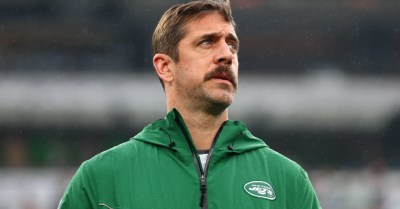With the New York Jets sitting at a disappointing 2-3 on the season and following the firing of head coach Robert Saleh, analysts are once again questioning whether acquiring quarterback Aaron Rodgers from the Green Bay Packers was the right move. The scrutiny has intensified as the team struggles to meet preseason expectations, and Rodgers, in particular, has come under fire.
During Thursday’s edition of Get Up on ESPN, former Pittsburgh Steelers safety and current analyst Ryan Clark, who played against Rodgers in the 2010 Super Bowl, offered a sharp critique of the Jets’ decision to bring Rodgers in.
Clark didn’t hold back, going as far as to say that Rodgers “catfished” the Jets—suggesting that the quarterback presented himself as something he was not, deceiving the organization about what he could still deliver at this stage of his career.
“The Aaron Rodgers we thought we knew was living in a fantasy land, a figment of our imagination,” Clark said. “The Aaron Rodgers that we mention in the same breath as Tom Brady and Peyton Manning—he was a catfish.”
RELATED: Stephen A. Smith Accuses Aaron Rodgers of Being Less Than Honest
Clark’s comments hit hard, implying that the version of Rodgers who once dazzled fans with MVP-level performances and a Super Bowl ring no longer exists.
He acknowledged Rodgers’ physical talents but argued that he lacked the intangible qualities that make players like Brady and Manning true greats. “Rodgers has every physical tool to have been the greatest quarterback to ever play this game. But there’s something missing in his intangible DNA—something that prevents him from being a great leader, from being able to elevate a locker room. And that’s what we’re seeing in New York,” Clark added.
The criticism may seem harsh, especially given that Rodgers has missed almost his entire first season with the Jets due to an Achilles injury he sustained just minutes into his first game with the team. His injury sidelined him before he could really begin to deliver on the lofty expectations the Jets and their fanbase had placed on him.

While Rodgers is now recovering, the situation has raised concerns about his ability to return to elite form. Despite his impressive resume, including four NFL MVP awards, the 40-year-old quarterback now faces questions about whether he can still be the player the Jets need him to be.
Through five games, he has thrown for 1,093 yards, seven touchdowns, and four interceptions—solid but not spectacular numbers, and far from what many expected from a player who was supposed to lead the Jets back to relevance.
Clark’s critique hits at the heart of the matter: while Rodgers may still possess his physical talents, the leadership and ability to inspire those around him—qualities that helped Brady and Manning cement their legacies—appear to be lacking. “The other two [Brady and Manning] had the MVPs and the championships, but what set them apart was their leadership. That’s the missing piece with Aaron Rodgers,” Clark explained.
As the Jets struggle to find their footing this season, many are left wondering if the Rodgers era in New York will ever truly get off the ground.
With Rodgers now back in action, the spotlight is on him to see if he can defy age and expectation and prove that the Jets made the right gamble in acquiring him. If not, Clark’s “catfish” label may stick.







